How to Make a Sleep-Friendly Bedroom

If you’re having trouble getting a good night’s sleep, it could be that your bedroom isn’t set up optimally. Use these four tips to help create a relaxing, sleep-friendly bedroom.
Late night TV, smartphone on the nightstand, laptop left open across the room—while these might be found in your average bedroom at night, they could actually be hurting your sleep quality. Make a few simple changes to your bedroom with these four tips and create a better sleep environment.
Darken Your Room
Light slows the production of melatonin, a naturally-occurring hormone that promotes sleep. That’s why keeping your bedroom dark is an essential part of creating a good sleep environment.
Dim the lights in your room as bedtime approaches to signal to your brain that it’s time to wind down for the night. Also reduce your blue light exposure—turn off electronics with screens like TVs and computers and set your smartphone to “nighttime” settings—continued exposure to this light can keep you awake even if you have your room lights turned off. To make sure your bedroom stays dark throughout the night, be sure to lower your shades or use blackout curtains.
Lower the Temperature
As you fall asleep, your body temperature naturally decreases to promote the sleep-inducing process. Keeping your bedroom cool facilitates this natural occurrence and makes it easier for you to fall asleep and stay asleep.
Optimal sleep temperature is slightly different for everyone, so experiment with different nighttime temperature settings in your search for a good sleep environment. In general, experts consider 60 to 67 degrees to be optimal for high quality sleep.
Choose a Comfortable Mattress and Sheet Set
Identifying what type of mattress, sheets, and pillows are most comfortable to you is important for a night of restful sleep.
Your mattress preference might depend on your sleep position, whether you share a bed, if you tend to “run hot” when you sleep, and other factors. A comfortable pillow will help support your neck and back throughout the night; a poorly chosen pillow, on the other hand, can contribute to headaches, neck pain, and arm numbness.
Also consider what you put on top of your mattress. Choosing a mattress cover or sheet set that feels pleasant will make it easier to fall asleep and decrease the likelihood that you wake up during the night from being too hot or too cold. Test out the feel of different sheets or blankets to determine which one you like best, then select your favorite ones.
Reduce Noise
Minimizing noise in the bedroom at night can increase the amount of deep sleep you get while also making it less likely that you’ll wake up during the night. When it’s time for bed, turn off all outside sounds (including the TV—the sudden changes in volume make it harder for you to fall and stay asleep). A quiet environment is much more conducive to a peaceful night of sleep.
If you live on a busy street or have a neighbor who stays up late practicing guitar, consider products that help to reduce or mask distracting noise. Try a white noise machine and try to position your bed away from shared walls or street-facing windows.
By setting up your bed in a way that’s most comfortable for you, and keeping your room dark, cool, and quiet, you’ll be able to transform your bedroom into a sleep environment that promotes restful nights.